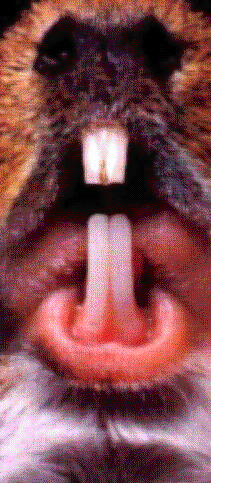
 Have a thorough examination done, including teeth – incisors and molars. Whenever these conditions occur, think TEETH. In older cavies especially it is sometimes easy to dismiss weight loss and finicky eating as just old age or an inevitable symptom of the end drawing near. Well, ain’t necessarily so. These symptoms can indicate many different problems. Your veterinarian will determine whether it’s teeth trouble or something else. Have a thorough examination done, including teeth – incisors and molars. Whenever these conditions occur, think TEETH. In older cavies especially it is sometimes easy to dismiss weight loss and finicky eating as just old age or an inevitable symptom of the end drawing near. Well, ain’t necessarily so. These symptoms can indicate many different problems. Your veterinarian will determine whether it’s teeth trouble or something else.
Incisors and molars can break, misalign and overgrow – making it difficult or impossible for the cavy to eat. A cavy may hang out at the feed dish, may even get some into his mouth, but if the problem is severe enough he’s probably not getting enough food ingested to survive. He’s hungry, but can’t feed himself.
If your cavy is losing weight or not eating, make an appointment to see a veterinarian ASAP. Then melt down some food pellets with warm water, mix in enough baby food cereal (jarred or powder) and more warm water to make a thin gruel. Feed this to your cavy with an eyedropper or small syringe. If he’s able to swallow it, give about 10 cc 3 or 4 times daily for an adult cavy. If he wants more, feed as much as he wants. Oxbow Hay Co. makes an excellent product called Critical Care, made specifically for syringe feeding sick or malnourished cavies and other herbivores. Check out the web site for further information (www.oxbowhay.com).
Molars are nearly impossible to see because they are far back on the jawbone, hidden behind fat bucal (cheek) pads. A veterinarian will use an otoscope and perhaps a bucal pad separator to get a good look at the molars. This can often be done without anesthesia. Trimming or filing problem teeth may require anesthesia, but not always. It depends on the extent and complexity of the work needed and how cooperative the cavy is. Trimming or filing problem teeth can give a cavy a new lease on life. Syringe feeding may be recommended for a few days longer for added nutrition and because newly trimmed teeth may be a little painful.
Teeth examination and corrective trimming really must be done by a veterinarian experienced and knowledgeable in dealing with cavies. I may be able to refer you to such a gem if you don’t already have one. Please note: cavies DO NOT normally need routine teeth trimming. Cavy teeth grow constantly and are normally worn down constantly by eating pellets and hay. Unless your cavy is having some abnormal problem his teeth do not need routine trimming. I am stressing this because I know of cases where a non-cavy veterinarian advised owners to bring their cavies in every few weeks for “maintenance” teeth trimming. Unless your cavy has misaligned teeth or some other problem – this is not needed.
Note: The bucal pad separator is a nifty little instrument I first heard about from cavy lover/author Peter Gurney of London, England. Sadly, Peter passed away July 1, 2006. Veterinarians can now get this instrument and other rodent dental instrument at:
Dr Shipp’s Laboratories
8361 W Tangerine Road
Marana AZ 85653
Toll Free 800-442-0107
Local 520-682-9972
Fax 520-844-1811
www.drshipp.com
For further information on anorexia (not eating) and dental problems please see the following information at GuineaLynx.com:
www.guinealynx.info/anorexia.html
www.guinealynx.info/teeth.html
© Copyright 1999 Vicki Palmer Nielsen – Jack Pine Guinea Pig Rescue
(Revised 2/2007)
|


